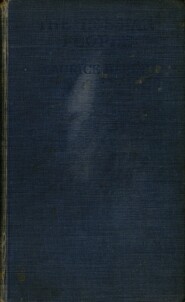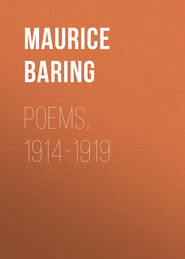По всем вопросам обращайтесь на: info@litportal.ru
(©) 2003-2024.
✖
Overlooked
Настройки чтения
Размер шрифта
Высота строк
Поля
"Mr. Arkright will tell it you better than I can," said Kathleen.
"I am afraid I don't remember it well enough," said Arkright.
He remembered the story sufficiently well, although being of no literary importance, it had small interest for him; but he saw that Miss Farrel had some reason for wanting it told, and for telling it herself, so he pressed her to indicate the subject.
"Well," she said, "it's about a man who had been all sorts of things: a soldier, a king, and a savant, and who wants to go into a monastery, and says he had done with all that the world can give, and as he says this to the abbot, a brass ring, which he wears round his neck, falls on to the floor of the cell. The ring had been given him by a queen whom he had loved, a long time ago, at a distance and without telling her or anyone, and who had been dead for years. The abbot tells him to throw it away and he can't. He gives up the idea of entering the monastery and goes away to wander through the world. I think he was right not to throw away the ring, don't you?" she said.
"Do you think one ought never to throw away the brass ring?" said Anikin, with the incomparable Slav facility for "catching on," who instantly adopted the phrase as a symbol of the past.
"Never," said Kathleen.
"Whatever it entails?" Anikin asked.
"Whatever it entails," she answered.
"Have you never thrown away your brass ring?" asked Anikin, smiling.
"I haven't got one to throw away," she said.
"Then I will send you one from London, I am going there in a day or two," he said.
"Mrs. Roseleigh was right," he said to himself, "no explanations are necessary."
Mrs. Roseleigh looked at him with approval. Kathleen Farrel seemed relieved too, as though a weight too heavy for her to bear had been lifted from her, as though after having forced herself to keep awake in an alien world and an unfamiliar sunlight, she was now allowed to go back once more to the region of dreamless limbo.
"Yes,", she said, "please send me one from London," as if there were nothing surprising or unexpected about his departure.
In truth she was relieved. The episode at Bellevue was as far away from her now as the dreams and adventure of her childhood. She felt no regret. She asked for no explanation. Anikin's words gave her no pang; nothing but a joyless relief; but it was with the slightest tinge of melancholy that she realized that she must be different from other people, and she would not have had things otherwise.
As Arkright looked at her dark hair, her haunting eyes and her listless face, he thought of the Sleeping Beauty in the wood; and wondered whether a Fairy Prince would one day awaken her to life. He did not know her full story; he did not know that she was a mortal who had trespassed in Fairyland and was now paying the penalty.
The enchanted thickets were closing round her, and the forest was taking its revenge on the intruder who had once rashly dared to violate its secrecy.
He did not know that Kathleen Farrel had in more senses than one been overlooked.
THE PAPERS OF ANTHONY KAY – Part II
II
Dr. Sabran read the papers I sent him the very same night he received them, and the following evening he asked me to dinner, and after dinner we sat on the verandah of his terrace and discussed the story.
"I recognized Haréville," said Dr. Sabran, "of course, although his Saint-Yves-les-Bains might just as well have been any other watering-place in the world. I do not know his heroine, nor her aunt, even by sight, because I only arrived at Haréville two years ago after they had left, and last year I was absent. Princess Kouragine I have met in Paris. She and yourself therefore are the only two characters in the book whom I know."
"He bored Princess Kouragine," I said.
"Yes," said Sabran, "that is why he has to invent a Slav microbe to explain her indifference. But Mrs. Lennox flattered him?"
"Very thoroughly," I said.
"Well, the first thing I want to know is," said Sabran, "what happened? What happened then? but first of all, what happened afterwards?"
I said I knew little. All I knew was that Miss Brandon was still unmarried; that Canning went back to Africa, stayed out his time, and had then come back to England last year; and that I had heard from Kranitski once or twice from Africa, but for the last ten months I had heard nothing, either from or of him.
"But," I said, "before I say anything, I want you to tell me what you think happened and why it happened."
"Well," said the doctor, "to begin with, I understand, both from your story as well as from his, that Kranitski and Miss Brandon were engaged to be married and that the engagement was broken off. But I also understood from your MS. that the man Canning was for nothing in the rupture of the engagement. It happened before he arrived. It was due, in my opinion, to something which happened to Kranitski.
"Now, what do we know about Kranitski as related by you? First of all, that he was for a long time attached to a Russian lady who was married, and who would not divorce because of her children.
"Then, from what he told you, we know that although a believing Catholic he said he had been outside the Church for seven years. That meant, obviously, that he had not been pratiquant. That is exactly what would have happened if he had been living with a married woman and meant to go on doing so. Then when he arrives at Haréville, he tells you that the obstacle to his practising his religion no longer exists. Kranitski makes the acquaintance of Miss Brandon, or rather renews his old acquaintance with her, and becomes intimate with her. Princess Kouragine finds she is becoming a different being. You go away for a month, and when you come back she almost tells you she is engaged – it is the same as if she told you. The very next day Kranitski meets you, about to spend a day at the lakes with Miss Brandon and evidently not sad – on the contrary. He received a letter in your presence. You are aware after he has read this letter of a sudden change in him.
"Then a few days later he comes to see you and announces a change of plans, and says he is going to Africa. He also gives you to understand that the obstacle has not come back into his life. What obstacle? It can only be one thing, the obstacle he told you of, which was preventing him from practising his religion.
"Now, what do we learn from the novel?
"We learn from the novel that the day after that expedition to the lakes, Rudd describes the Russian having a conversation with the novelist (himself) in which he tells the novelist, firstly, that he is going away, probably to Africa. So far we know that he was telling the truth. Then he says that just as he found himself, as he thought, free, an old debt or tie or obligation rises up from the past which has to be paid or regarded or met. Rudd, in the person of Arkright, thinks he is inventing. They talk of conflicts and divided duties and the choice between two duties. The Russian is made to say that the most difficult complication is when duty and pleasure are both on one side and an obligation is on the other side, and one has to choose between them. The novelist gives no explanation of this, he treats it merely as a gratuitous piece of embroidery – a fantasy.
"Now, I believe the Russian said what Rudd makes him say, because if he didn't it doesn't seem to me like the kind of fantasy the novelist would have invented had he been inventing. If he had been inventing, I think he would have found something else."
"All the same," I interrupted, "we don't know whether he said that."
"We don't know whether he said anything at all," said Sabran.
"I know they had a conversation," I said, "because I was in the park all that morning and someone told me they were talking to each other. On the other hand, he may have invented the whole thing, as Rudd says that the novelist in his story knew about the Russian's former entanglement, and lays stress on the fact that the Russian did not know that he knew. So it may have been on that little basis of fact that all this fancy-work was built."
"I think," said Sabran, "that the conversation did take place. And I think that it happened so. I think he spoke about the past and said that thing about the blotting paper. There is a poem of Pushkin's about the impossibility of wiping out the past."
"And I think," I said, "that the Russian laughed, and said, 'You novelists are terrible people.' Only he was laughing at the novelist's density and not applauding his intuition."
"Well, then," said Sabran, "let us postulate that the Russian did say what he was reported to have said to the novelist, and let us conclude that what he said was true."
"In that case, the Russian said he was in the position of choosing between a pleasure, that is to say, something he wanted to do which was not contrary to his duty – "
"For which duty might even be pleaded as an excuse," said Sabran, quoting the very words said to have been used by the Russian.
"And an obligation which was contrary both to duty and to inclination. That is to say, there is something he wants to do. He could say it was his duty to do it. And there is something he doesn't want to do, and he can say it is contrary to his duty. And yet he feels he has got to do it. It is an obligation, something which binds him."
"It is the old liaison," said Sabran.
"In that case," I said, "why did he go to Africa?"
"Yes, why did he go to Africa? And stay there at any rate such a long time. Did he talk of coming back?"
"No, he said nothing about coming back. He said he liked the country and the life, but he said little about either. He wrote chiefly about books and abstract ideas."
"Perhaps," said Sabran, "there is something else in his life which we know nothing about. There is another reason why I do not think that the old liaison is the obligation. He took the trouble to come and see you before he went away and to tell you that the obstacle which had prevented his practising his religion had not reappeared in his life. It is probable that he was speaking the truth. And he knew he was going to Africa. So it must be something else."
"Perhaps," I said, "it was something to do with Canning. What are your theories about Canning, the other man?"
"I am afraid I don't remember it well enough," said Arkright.
He remembered the story sufficiently well, although being of no literary importance, it had small interest for him; but he saw that Miss Farrel had some reason for wanting it told, and for telling it herself, so he pressed her to indicate the subject.
"Well," she said, "it's about a man who had been all sorts of things: a soldier, a king, and a savant, and who wants to go into a monastery, and says he had done with all that the world can give, and as he says this to the abbot, a brass ring, which he wears round his neck, falls on to the floor of the cell. The ring had been given him by a queen whom he had loved, a long time ago, at a distance and without telling her or anyone, and who had been dead for years. The abbot tells him to throw it away and he can't. He gives up the idea of entering the monastery and goes away to wander through the world. I think he was right not to throw away the ring, don't you?" she said.
"Do you think one ought never to throw away the brass ring?" said Anikin, with the incomparable Slav facility for "catching on," who instantly adopted the phrase as a symbol of the past.
"Never," said Kathleen.
"Whatever it entails?" Anikin asked.
"Whatever it entails," she answered.
"Have you never thrown away your brass ring?" asked Anikin, smiling.
"I haven't got one to throw away," she said.
"Then I will send you one from London, I am going there in a day or two," he said.
"Mrs. Roseleigh was right," he said to himself, "no explanations are necessary."
Mrs. Roseleigh looked at him with approval. Kathleen Farrel seemed relieved too, as though a weight too heavy for her to bear had been lifted from her, as though after having forced herself to keep awake in an alien world and an unfamiliar sunlight, she was now allowed to go back once more to the region of dreamless limbo.
"Yes,", she said, "please send me one from London," as if there were nothing surprising or unexpected about his departure.
In truth she was relieved. The episode at Bellevue was as far away from her now as the dreams and adventure of her childhood. She felt no regret. She asked for no explanation. Anikin's words gave her no pang; nothing but a joyless relief; but it was with the slightest tinge of melancholy that she realized that she must be different from other people, and she would not have had things otherwise.
As Arkright looked at her dark hair, her haunting eyes and her listless face, he thought of the Sleeping Beauty in the wood; and wondered whether a Fairy Prince would one day awaken her to life. He did not know her full story; he did not know that she was a mortal who had trespassed in Fairyland and was now paying the penalty.
The enchanted thickets were closing round her, and the forest was taking its revenge on the intruder who had once rashly dared to violate its secrecy.
He did not know that Kathleen Farrel had in more senses than one been overlooked.
THE PAPERS OF ANTHONY KAY – Part II
II
Dr. Sabran read the papers I sent him the very same night he received them, and the following evening he asked me to dinner, and after dinner we sat on the verandah of his terrace and discussed the story.
"I recognized Haréville," said Dr. Sabran, "of course, although his Saint-Yves-les-Bains might just as well have been any other watering-place in the world. I do not know his heroine, nor her aunt, even by sight, because I only arrived at Haréville two years ago after they had left, and last year I was absent. Princess Kouragine I have met in Paris. She and yourself therefore are the only two characters in the book whom I know."
"He bored Princess Kouragine," I said.
"Yes," said Sabran, "that is why he has to invent a Slav microbe to explain her indifference. But Mrs. Lennox flattered him?"
"Very thoroughly," I said.
"Well, the first thing I want to know is," said Sabran, "what happened? What happened then? but first of all, what happened afterwards?"
I said I knew little. All I knew was that Miss Brandon was still unmarried; that Canning went back to Africa, stayed out his time, and had then come back to England last year; and that I had heard from Kranitski once or twice from Africa, but for the last ten months I had heard nothing, either from or of him.
"But," I said, "before I say anything, I want you to tell me what you think happened and why it happened."
"Well," said the doctor, "to begin with, I understand, both from your story as well as from his, that Kranitski and Miss Brandon were engaged to be married and that the engagement was broken off. But I also understood from your MS. that the man Canning was for nothing in the rupture of the engagement. It happened before he arrived. It was due, in my opinion, to something which happened to Kranitski.
"Now, what do we know about Kranitski as related by you? First of all, that he was for a long time attached to a Russian lady who was married, and who would not divorce because of her children.
"Then, from what he told you, we know that although a believing Catholic he said he had been outside the Church for seven years. That meant, obviously, that he had not been pratiquant. That is exactly what would have happened if he had been living with a married woman and meant to go on doing so. Then when he arrives at Haréville, he tells you that the obstacle to his practising his religion no longer exists. Kranitski makes the acquaintance of Miss Brandon, or rather renews his old acquaintance with her, and becomes intimate with her. Princess Kouragine finds she is becoming a different being. You go away for a month, and when you come back she almost tells you she is engaged – it is the same as if she told you. The very next day Kranitski meets you, about to spend a day at the lakes with Miss Brandon and evidently not sad – on the contrary. He received a letter in your presence. You are aware after he has read this letter of a sudden change in him.
"Then a few days later he comes to see you and announces a change of plans, and says he is going to Africa. He also gives you to understand that the obstacle has not come back into his life. What obstacle? It can only be one thing, the obstacle he told you of, which was preventing him from practising his religion.
"Now, what do we learn from the novel?
"We learn from the novel that the day after that expedition to the lakes, Rudd describes the Russian having a conversation with the novelist (himself) in which he tells the novelist, firstly, that he is going away, probably to Africa. So far we know that he was telling the truth. Then he says that just as he found himself, as he thought, free, an old debt or tie or obligation rises up from the past which has to be paid or regarded or met. Rudd, in the person of Arkright, thinks he is inventing. They talk of conflicts and divided duties and the choice between two duties. The Russian is made to say that the most difficult complication is when duty and pleasure are both on one side and an obligation is on the other side, and one has to choose between them. The novelist gives no explanation of this, he treats it merely as a gratuitous piece of embroidery – a fantasy.
"Now, I believe the Russian said what Rudd makes him say, because if he didn't it doesn't seem to me like the kind of fantasy the novelist would have invented had he been inventing. If he had been inventing, I think he would have found something else."
"All the same," I interrupted, "we don't know whether he said that."
"We don't know whether he said anything at all," said Sabran.
"I know they had a conversation," I said, "because I was in the park all that morning and someone told me they were talking to each other. On the other hand, he may have invented the whole thing, as Rudd says that the novelist in his story knew about the Russian's former entanglement, and lays stress on the fact that the Russian did not know that he knew. So it may have been on that little basis of fact that all this fancy-work was built."
"I think," said Sabran, "that the conversation did take place. And I think that it happened so. I think he spoke about the past and said that thing about the blotting paper. There is a poem of Pushkin's about the impossibility of wiping out the past."
"And I think," I said, "that the Russian laughed, and said, 'You novelists are terrible people.' Only he was laughing at the novelist's density and not applauding his intuition."
"Well, then," said Sabran, "let us postulate that the Russian did say what he was reported to have said to the novelist, and let us conclude that what he said was true."
"In that case, the Russian said he was in the position of choosing between a pleasure, that is to say, something he wanted to do which was not contrary to his duty – "
"For which duty might even be pleaded as an excuse," said Sabran, quoting the very words said to have been used by the Russian.
"And an obligation which was contrary both to duty and to inclination. That is to say, there is something he wants to do. He could say it was his duty to do it. And there is something he doesn't want to do, and he can say it is contrary to his duty. And yet he feels he has got to do it. It is an obligation, something which binds him."
"It is the old liaison," said Sabran.
"In that case," I said, "why did he go to Africa?"
"Yes, why did he go to Africa? And stay there at any rate such a long time. Did he talk of coming back?"
"No, he said nothing about coming back. He said he liked the country and the life, but he said little about either. He wrote chiefly about books and abstract ideas."
"Perhaps," said Sabran, "there is something else in his life which we know nothing about. There is another reason why I do not think that the old liaison is the obligation. He took the trouble to come and see you before he went away and to tell you that the obstacle which had prevented his practising his religion had not reappeared in his life. It is probable that he was speaking the truth. And he knew he was going to Africa. So it must be something else."
"Perhaps," I said, "it was something to do with Canning. What are your theories about Canning, the other man?"











